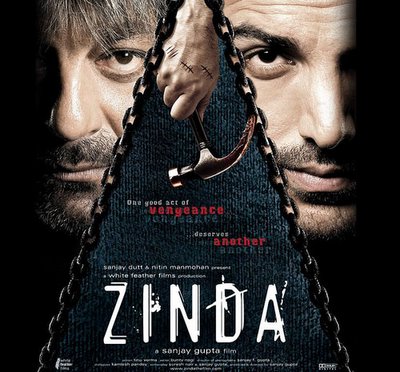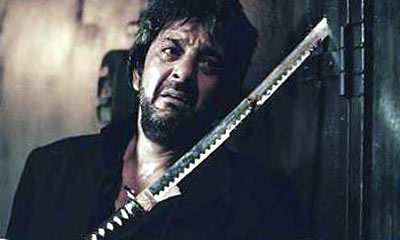
The general quality of the picture has improved drastically in Hindi cinema. The image on screen was pretty crisp, and since this has happened to even low profile releases like Zinda, then it just goes to show how steadily our technology is improving.
The movie started with Bala (Sanjay Dutt) walking around like he had just swam with a bunch of unsatiated Sharks. Knew right then that the movie would lurch into a flashback, and predictably enough, it did.
Meaningless flashback to Bala, Joy (Manjrekar) and Neha (Jaitley) messing around. Neha is Bala’s newlywed wife, and Joy is just this dude who hangs around as a friend to both of them. Now Celina acts like she has just been brought in to auditions for a kid’s role in a toothpaste ad. She is like Sneha Ullal in that totally forgotten flick – only even more childish. Scary thought I know, but cannot be helped. Such things go to prove the existence of the casting couch I guess. A total miscast. Anyone, absolutely anyone else in the industry from Priety Zinta to Kareena to Kajol to Aishwarya Rai would have suited the role better. Celina was outright pathetic, trying to be sweet and failing horribly. Made you remember candy floss gone stale.
Celina was about the only serious mistake in the film. Celina and the assumption that stitching back your wrist together after it has been cut can keep you alive. They should have consulted a doctor on that, but such things are easy to overlook…
So Nisha gets pregnant, runs towards Bala to tell him the good news, and Bala has disappeared.
He wakes up in a cell where he is going to spend 14 years of his life. Nisha dies while Bala is in his cell, murdered by people who have planted evidence at the crime scene to prove that Bala had been there (blood samples, a glass with fingerprints etc has been taken from Bala’s cell). The progress of his 14 years in the cell is shown very nicely, the news of the past 14 years is shown as Bala watches it. One day, without explanation, he is set free to the outside world. Now Sanjay Dutt’s only aim is to find his captor and kill him.
The first half of the movie is full of Sanjay Dutt eating some kind of muffins. In the first half of the first half, Sanjay Dutt is eating the same old thing day after day in his cell, and in the second half of the second half, he is eating the same old thing in every restaurant in Thailand in search of the restaurant that provided the muffins to the cell. He is shown around the city by a taxi driver, Jenny (Lara Dutta).
Love developes between Jenny and Sanjay, while it is painfully obvious that this is going to happen the second Lara shows up on screen, the development of this love could have been depicted in a better manner.
What follows are a few action sequences requisite in every Sanjay Gupta film. Really gory sequences, with sexual overtones play out. The dialogue writer (Kamlesh Pandey) has tried replicate the amazing dialogues in Musafir, Sanjay Gupta’s previous film, but has failed horribly. Like Bala tells this really freaked out mafia dude that he will chop off his hands for laying them on Jenny, and the freaked out dude rolls his tongue and says “phir zhuban bhi kaatna padega” (Then you will have to chop off my tongue too). This was cheap, neither threatening nor dark.
Transpires that Rohit Chopra (John Abraham) has kept him captive for something Bala had done back in his school days. He had convinced his friends that he had fucked Reema Chopra (Rohit’s elder sister), and he was asked to do this on a dare worth fifteen bucks. People started teasing Reema and her brother, and the trauma led to Reema immolating herself.
Rohit’s revenge involved holding Bala captive for fourteen years, and then putting his daughter (from Nisha) up for grabs at this whoremarket where she’d lose her “masumiyat” to the highest bidder. There is a fight sequence between Bala and Rohit, but it is slightly disappointing because Rohit does not fight back, despite all the rude interruptions of Rohit’s training during the Bala-Jenny sex scene.
The other fight sequences though, are well orchestrated. You know these hindi films have the reputation, when the hero fights a bunch of thugs, only one of them attacks at a time. Sanjay fights a bunch of thugs, and mostly only one of them attack at a time, but in this sequence, the body language of the thugs are so good, that you understand exactly why they attack mostly one at a time. The fighting and the bloodshed makes total sense.
Rohit goes to the edge of a highrise and jumps off.

This still never took place in the film, and couldn't have. Bala reaches Rohit when its too late...
Seems that when in a tight spot, Abraham takes the more “dignified” way out by simply committing suicide. Did the same thing in Dhoom. Rohit dies without telling Bala where his daughter’s virginity is being auctioned.
Jenny and Bala set out to find his daughter, and Bala amputates a few limbs on the way. The movie culminates to a very good climax, one of Rohit’s final revenge.
The movie was apparently copied from Oldboy, which is a pretty recent film. No points taken off for the story being a copy, because Zinda was gripping, who cares if it was unoriginal. Not that Torrentino lost any credit for copying Kill Bill (even using the same sets as the original film). Speaking of Kill Bill, those who have seen Kill Bill, and for that matter, any Quentin Torrentino film, would have seen the tributes/influence, but the sword fight in front of the blue lit windows is a direct copy. Even the sword is of the same type.

Like the basketball in Kuch Kuch Hota Hai, a hammer has a role in this film. It shows up in the posters, and actually replaces Manjrekar on the site. Instead of Dutt-Abraham-Manjrekar-Dutta-Jaitley, the cast is pictorially depicted as Dutt-Abraham-Hammer-dutta-Jaitley. In some posters, there is only the hammer and nothing else.

A few obvious flaws, but Gupta has bettered Musafir and Kaante with Zinda.
2 comments:
d movie is a bit dark but not a damp squib. d cinehall was dark too considerin der werent many ppl. point being its is an effort in vain. sanjay gupta can be a DVD rip-off king.
blood, there’s a lorry-load of it in Zinda. A man is threatened by having a drill bore through his flesh; blood spurts out. Someone else is threatened by having his teeth prised out with a claw hammer; more blood spurts out. And when people aren’t being threatened, they’re either being beheaded (more blood), or stabbed (more blood), or they’re slashing their wrists (even more blood). And this blood is dark, viscous, frighteningly real – it’s nothing like the bright-red-ketchup-stain blood of older Hindi movies.
But then Zinda itself is nothing like older Hindi movies. This is a film where the hero tucks into a portion of steak, where the heroine pops open a can of Heineken for herself, and where someone referred to as Nisha bhabhi shows off enough cleavage to rival an item-number dancer. (Take that, Renuka Shahane from Hum Aapke Hain Koun!) Sounds very Western, right? But the inspiration is Eastern – the Korean Oldboy. (Not surprisingly, the director here is Sanjay Gupta, who was inspired by Reservoir Dogs and U-Turn for his Kaante and Musafir respectively.)
I haven’t seen Oldboy, so I can’t tell you if this is a shot-by-shot lift or merely a sequence-by-sequence lift – I’d bet, though, that the ending is Gupta’s own invention; it’s a major cop-out – but either way, this is one hell of a stylish ride. The cinematographer is Sanjay F Gupta, and his grimy, attitude-soaked compositions are almost entirely responsible for making Zinda seem like his directorial venture Karam – less a movie than a mood piece. And I’m also mentioning Karam because Zinda is about karam, karma – whatever you want to call it; the consequence of one’s acts.
Balajit Roy (Sanjay Dutt) has a beautiful wife (Celina Jaitley, as the Nisha bhabhi I told you about), a fabulous home by the sea, and a great pal (Mahesh Manjrekar) – and just when you think he’s got everything, he disappears. (And I literally mean... disappears. One moment he’s walking out towards the sea; the next – poof! – he’s vanished.) He wakes up in a cell, and – in scenes that are impossible to watch without drawing parallels to Dutt’s real-life travails – finds himself imprisoned, without knowing why and by whom. After 14 years, he’s set free just as suddenly as he was shut in. And now he wants to know why and by whom.
So this is a why- as well as whodunit, and as Balajit puts together the pieces of his strange story, Zinda plays out increasingly like a revenge-fantasy jigsaw puzzle jointly devised by Sade and Gabbar Singh. No mode of torture, no kind of violence, no depiction of brutality is too much. At times, I wondered: is this entertainment or an endurance test? The answer, of course, is that it’s both – which is why this isn’t for everyone; only those with a sturdy heart and a sturdier stomach. So if you’re up for it, Zinda works quite well as the cinematic equivalent of a horrific roadside accident – you know it’s not nice to look, but you can’t stop your morbid curiosity, and that’s a revelation as much about the movie as about you.
But where Zinda comes up short is in its attempts to be more than just the cinematic equivalent of a roadside accident. It wants to make profound observations about how even unwitting misdeeds of yours can come and bite you on the rear-end – that whole karma thing – and that we can never quite shake off our childhood, however old we get. But very little of that comes across, mainly because of the performances.
Dutt is good enough – and he’s certainly physical enough for the part – but he’s too sleepy-eyed an actor to fully give off the blazing, vengeance-is-mine rage he’s supposedly feeling. And John Abraham, as an important link in the chain of events, is too much of a hunky blank to carry off pseudo-philosophical ramblings like, “Tumhare dard ne hi mujhe zinda rakha.” But even he comes off better than Lara Dutta, who’s (mis)cast as a Punju cabbie given to musings about her dead mother: “Mummy chali gayi God ke liye parathe banane.” (I suddenly found myself wishing for Johny Lever’s sardar in Raja Hindustani; at least he had the decency to spare us the observations about home-cooked food in the hereafter.) But maybe such a film needed such comic relief, intended or otherwise. Maybe these compromises are inevitable in something so drastically different – and it is nice not to have to sit through the same old thing on yet another Friday.
Post a Comment